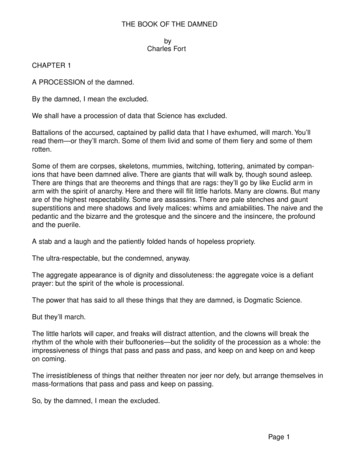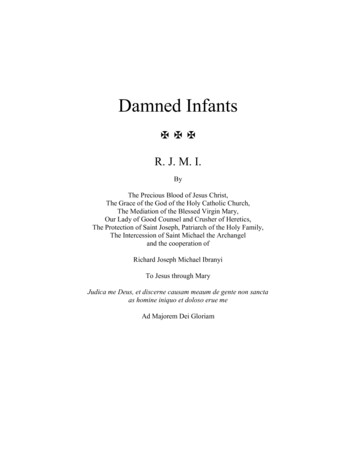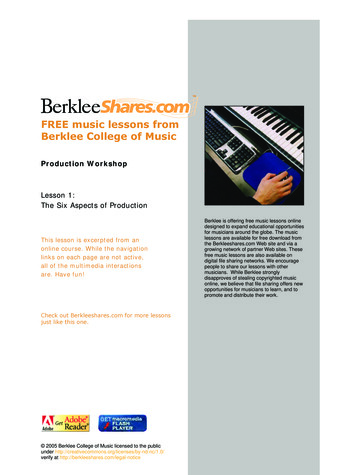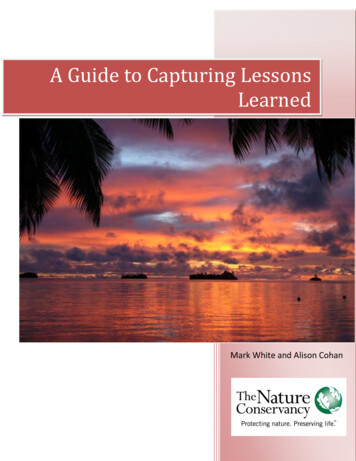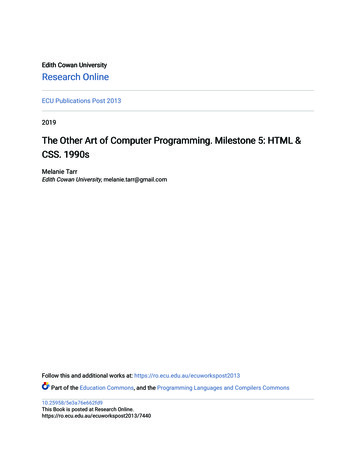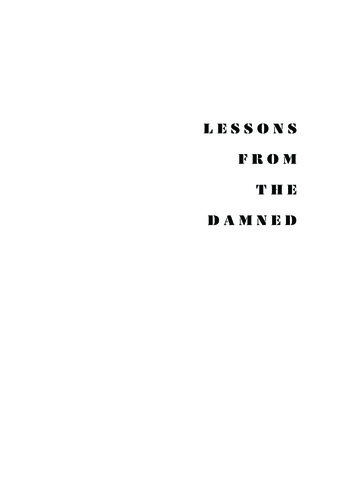
Transcription
LESSONSFROMTHEDAMNED
LESSONSFROM
CLASS STRUGGLE INTHE BLACK COMMUNITY4
by the damned
Class Struggle in aBlack Community11Years ofAwareness15Conflict andStruggle37The Revolt ofPoor Black Women147The Educationof Poor Blacks189Lessons fromthe Damned241Appendix: Dictionary257
All oppressors and exploiters, against whom everyone like ushas been forced to struggle:Read this book with the knowledge that we have come out ofyou and in that way, have begun to own ourselves. Now slowlywe turn to face you, resolutely, in love and burning determination, to end your unjust rule.You have been having our rights so long, that you think, likea slave-holder, that you own us. I know that it is hard for onewho has held the reins for so long to give up; it cuts like a knife.It will feel all the better when it closes up again.—SOJOURNER TRUTH, 1867
c l ass struggle in a b l ac k communit yUnderstand what we’re saying! The town we live in is “sweetsuburbia,” fifty minutes from the Big Apple. White folks treatniggers good here. A few well-known black families in thefields of entertainment, banking, advertising, brokerage, andthe responsible civil rights organizations add to the town’supper and middle-class reputation.Our old town has a long history of treating people of colorreal good. It was purchased from the Indians by the DutchWest India Company in 1640. The Indians lived in the areauntil 800 of them were massacred, in about 1687, by the whitesettlers. The history texts show 44 slaves and 188 whites in1698. The slaves were treated well, given Christian names andset free from time to time.It’s a good town. Like all Northern cities, the town took insome of the Southern black immigrants after World War I.They were hired as house servants and, like the first slaves,worked in the white homes and gardens. For good and faithfulservice these house servants were provided, by their rich whiteemployers, with small inexpensive homes near the downtownsection of the city.11
Niggers began to feel like somebody. With these homes theywere able to be devoted workers and eager consumers of thedowntown white business. They established many churches,and a few small businesses of their own, mainly barber and tailor shops, newspaper and candy stores. Black churches tookaway the sting of reality, the sting of powerlessness.The common past forgotten, the small black communityhardened into class differences based on length of residence,domestic employment with “the right, white family,” membership in the “right” church. Quiet and vicious class conflicts separated and mystified each generation. Over all hung a mist ofpetty puritanism, good over evil, an insane dream that coveredthe facts. Understand what we’re saying?It would be easy to feel smart about this book and how it hasdeveloped—almost as if it had a life of its own. But it would bea lie to feel that way.Most of us who put this book together are poor blacks, asub-proletariat just on the edge of the work force. But moreimportant, we all come from families striving to be petit-bourgeois, field niggers wanting to be house niggers, project dwellersone step up from the slums. We have all been forced into housenigger philosophy. Throughout history every class has createdits own philosophy and forced it on other classes as it took12
power over them. Since the 1700s the middle class has completely controlled those of us who work for wages and receivewelfare by brainwashing us into their philosophy, religion, education, capitalist economic system, and the ideas of male andwhite supremacy. We all take in the ideology of the ruling classand act in its interest, not our own.This book covers our struggle over a long span of time—fromour first political consciousness as a community of oppressedblack people through our growing awareness of our oppressionas workers and poor people in a capitalist economic system, andas women and young people oppressed by men and the family.We have analyzed our petit-bourgeois class—people whostrive in vain toward being middle-class and who, at the sametime, fear falling back into the poverty that is so close—a class ofpeople who are out of their minds. We have analyzed the enemy,and found it black bourgeoisie as well as white bourgeoisie, relatives and friends who are petit-bourgeois and striving to bebourgeois as well as bosses and politicians who are thoroughlybourgeois. We have analyzed our oppression and found that itdepends on our own cooperation. We have studied history andeconomics and found that poor black Americans benefit from theexploitation of our sisters and brothers in Africa, Asia and LatinAmerica.13
The papers we have chosen for this book were written by alarge number of poor and petit-bourgeois black people—thedamned—poor students, poor, unemployed, young women andmen (the street bloods), workers in low-paying, dead-end jobs,and women welfare recipients. With few exceptions, the blackliberation movement has been controlled by middle-class blacksin their own interest. This book may be the first time that poorand petit-bourgeois black people have described the full realityof our oppression and our struggle. We have tried to speak inthe name of countless others who have been denied the privilege. Please let our individual names pass away and be forgotten with all the nameless like us—and those too who wentbefore and yet in reality made it possible for us to speak today.*A note on the dictionary: This book is being written for theblack community and the white community, the poor, the petitbourgeois and the middle class, the politically experienced andthose without knowledge of political concepts. On pp. 259–61are explanations of some of the political terms used in thisbook. We encourage those unfamiliar with these terms to checkout the dictionary before beginning.14
YEARSOFAWARENESS
During the late fifties and through the early sixties, all of us asseparate black people felt that we knew something was wrong.We all agreed that, individually and before we came together,we had hazy feelings of being cheated, feelings of emptinessand loneliness and confusion and a kind of cynicism. (Fuck it!)Most of all, we felt our problems were personal and individual.All of us were looking for a connection and a reflection thatwould bring us together with others—for what we didn’t know.Now we all realize if we had not found each other, each one ofus knows we would have destroyed ourselves or allowed ourselves to be destroyed.When we came into contact with political people personallyor through listening and reading, their explanations began toput things in place. We never knew Malcolm X until his death.The Master gave us Martin Luther King. Those of us whowere Southerners dug him because he fit our rising aspirationsand dreams of making it. We also had had a chance to go tocollege. Martin Luther King with his own bourgeois philosophy fit our Southern bourgeois feelings. We had been used topassivity to preacher all our lives. Non-violence and asking17
Massa through preacher-man for reforms was our historicalreality.Most of us were Northerners and felt King was a fool. Asblack, Northern, young city-slickers, project dwellers, jive-assniggers, we felt you should fight back for power for yourselves.We really wanted power to fuck somebody else. We had takenin the master’s standards from church, school and our parents.(Wilhelm Reich called German working-class families, ideology factories—brainwashing.) Our parents were the runningdogs of the ruling class. Therefore, we learned to want tobecome oppressors. That was living—being on top!Northern or Southern negro—all we wanted was the man’smoney—not the responsibility for running the society, thebanks, the factories, the farms, the mines, the schools, etc.Power was having money and being on top within the system.We didn’t understand the, system, what it was called, how it ranworldwide and its long, bloody history. All we knew was, if youget into the system, you’ve made it!We acted as if we could physically take power. We imitatedthe most highly publicized, young black group of that time. Weconfronted the greater military force of the white man. Thislanded us into the master’s courts, then his jails. All the whilewe romantically loved the attention, the raised fists, the roars of18
“Right On!” We finally felt important, felt that we were somebody and that somehow we had power.This is when we also confronted the whole negro sub-powerstructure in the town. In the courtroom they told us, “This iswhiteman’s territory. Stick with us! Plead guilty!” They advisedus that meanwhile they would take care of licking the whiteman’s boots, so we wouldn’t go to jail. But we knew where theywere at; we didn’t plead guilty.We began to realize that we had become a threat—not just to“whitey”—but to our parents, ministers, our negro teachers andto many of our childhood friends. We were a threat to theirstatus, their position in society, their privileges, their acceptanceof the American Dream. At the fundraising benefits, the negroleaders and our parents warned us, “You’ll never run over me!”Some negro politicians brought guns to show us how theywould deal with us.We called a “Peoples’ Meeting” in the center of one of theprojects. This day of public confrontation with our parents was“Our Day.” We enjoy it now, just thinking about it. Some of usstationed ourselves on every rooftop of the projects. Some of ustook positions in the crowd. The rest of us, mostly the women,pointed out the “nigger pigs” in plain clothes. Parents reeledbackwards as we attacked their historical cowardice and their19
hypocrisy. They whispered to each other, “Are they going to killus?” We yelled, “If necessary, yes!”This was the first time we had met and begun to deal withfamily oppression, the first time we got off the whitey-honky bit.The unarmed action not only helped free us further but forcedthe political recognition that the struggle was not just blackagainst white—there were enemies among blacks.We felt also that we were running ahead of everything and itwas getting hard to communicate with people. They were turnedoff by our violent talk. We were getting into a lot of conflicts. Sowe made a retreat, read, rapped a lot and eventually we discovered class struggle. It fit our situation exactly. The concept andidea of class struggle destroyed our all-black hang-up and ourall-black organization. It took us to another level of politicalconsciousness. It spread our world out a little further.Now we could put the Italians in their proper place in theladder of power in the town. Then we placed the Irish andfinally the Jews. Scared away, the WASPs had fled to the northern section of town. Each ethnic group was like a class above us.Black people were at the very bottom. Within that bottom wereother layers of power. We determined to go to that bottom layer.During this retreat, we had to face the fact that we had beenjive all along. Most of the very poor blacks knew it and gave us20
little or no support. We had to admit that deep down we knewwe were phony. We had wanted to use the people for a hustle.We were jive-ass opportunists.There were those who told us but we blotted it out. Whenwe were pushed against the wall by the white and black powerstructure, including our parents, the only way out was facingthe truth of what we really had been—oppressed people whowanted to take the master’s place, to reverse the roles.We went to the bottom layer of our people, offering them ourservices in any and all ways —from fixing cars to baby-sitting.Sometimes we allowed ourselves to be used, thinking that wewere supposed to do anything for the people because they werepoor and oppressed. We felt guilty because we had fucked upso bad. When the guilt was gone, we leveled with the peopleand they leveled with us. We were using them to take away theguilt and they were using us because they felt we were like allthe rest who had come to them—full of bullshit!We formed a school and a players group with the idea of deeducating and then re-educating the children in and around theprojects. We soon found out that black nationalist and community-action groups wanted to get in on our educational set-up.We didn’t understand that there was still something incorrect inour approach. If these hustlers wanted in, there had to be some-21
thing wrong. We thought that we just needed to educate thesetake-off artists.Having the masses come from their homes to a central placetakes them out of their oppressive environment, releasing themtemporarily from their oppression and offering them falsehopes, “sugar-coated” bullets full of escape, yet a trap. Theirfrustrations are released for a little while but there can be nolong-term or real change. Bringing the poor out of the slum andaway from the physical and mental decay is taking them on atrip—an addict’s trip, an alcoholic trip, a nodding out, a releasein the brain and muscles—hooking the suckers on the American Dream.From the point of view of the oppressed, we dig that temporary trip. We were not all that elite or striving to be bourgeoisthat we did not appreciate how our brothers and sisters canlong for such a brief connection with false liberation.At the same time, we could dig ourselves and our need toavoid the struggle and pain of the slum. We lived in the projectsnow, one step up from the hovels around us; our parents werescrambling to get a little house of their own. If we held ourclasses in some community center or boys club, we couldescape the constant interruptions of neighbors stopping in,the damn TV, the phonograph blasting, the sudden arguments22
between black man and woman, the running roaches and theoccasional rat, the lack of space and on and on and on! Wecould hold classes like the bourgie white folks did. (The word“bourgie” is slang for bourgeois; it is pronounced bōō’. zhē.)This whole gig is the missionary approach . . . “I’ll help youbut don’t get me involved with your life and your problems. Justlet me get my shit off!” This was an old gig. But now there weresome new missionaries. Bourgeois negroes came into ourneighborhoods when we rebelled, followed by the nationalistsand the community-action groups to cool us down so theycould operate on their hustle. These were the new missionaries.And they were black, not white. So we learned that it was betterfor the growth of the people for them to stay in their environment and deal with it because that is the reality of their life ofoppression. They had been forced there by violence, the violence of a striving and competitive middle class; black andwhite.As we struggled with the new black missionaries and themissionary in us, we deepened our political analysis historically.We went back into the history of slavery here in the North andthe slave hierarchy established by the plantation masters on theSouthern farms. We were better able to struggle against andexpose the missionaries, new and old.23
Finally the negro missionaries were forced to take actionagainst us, and in so doing exposed themselves further. Theypublicly, and with the help of the police department, put us outof their churches, the community centers and boys club. Youngpeople were receiving an education about their real oppressionand about the agents of that oppression. They could see it forthemselves.This decisive action, along with our teaching the youngpeople the history of race and class struggle in this country andAfrica, allowed our students to see that they had a real right torebel against authority. It was unjust! Authority in the blackcommunity and the white community was used to make eachgeneration submit without question to being used and abusedas objects, beasts of burden, machines, unthinking consumers,strike breakers and cheap labor. We could not own anything wemade. We could not own land. We were separated from everything that gives people a good feeling about themselves. Somost of us ended up feeling like “I ain’t nothing so what can Ido but accept things as they are?” For four hundred years wehad been handed the racial oppression line with the class linecovered up. It was not one or the other. It was both, damn it!And black intellectuals have been and are liars. Nothing in thisworld makes young people madder than to trust and then find24
out we’ve been lied to. We will forgive grown-ups anything,even trying to murder us, if they tell the truth.We were forced closer to our most oppressed brothers andsisters. We went into the homes of our students and politicallyeducated them in depth. We found ourselves being asked bythe parents to help them understand what was happening outside in the world. We got passed on to the neighbors. As theyopened up to us, we opened up to them.We want to make it very plain that we, and others like us, areno better than any part of the suffering oppressed masses ofpoor people. The only difference is that we were forced by theobjective conditions in our community to learn through hardstruggle who the real enemy is. We discovered the whole webof oppression in America. And, most important, we saw howwe helped in our own oppression. And what we’ve learned wemean to pass on!The main thing that we found in dealing with other bloodsoutside of our immediate families was the lack of trust that wasleft there by too many half-ass people and groups. The contactwith other suffering poor people was what we needed. Nothingwas more meaningful than the love we were given and still arebeing given. We finally felt our lives were worth living.Once we established that trust we were shown the genuine25
love that had been missing throughout our growth. Our livesshall never be the same. We have risen from the dead—a concept that occurred to us after reading David Walker’s Appealof 1829, where he gave a history of the word negro. Walkerexplained that “negro” comes from the Greek word niger, andmeant soot, ashes, a pot—in other words, dead things whichhad once been alive. We dug that definition because we knewnegroes who were dead—us! We began to enter into a processof rebirth. Our base widened and we found ourselves becominga physical and emotional part of what we had tried to escape—our people, our real life, our real crib. We had been drivenhome. We were no longer negroes, that class of black peoplewho remain dead.In the 1960s, students in France, Italy, Germany, Pakistan,South Korea, Japan and Ceylon were revolting against theunjust authority of’ their society and its agents. Here in theUnited States, white middle-class students were running awayfrom home, rebelling against their parents, organizing againsttheir college administrations and against the Vietnam War.In our town, older white people were distressed that youngpeople had no place to call their own, where they could gatherfor public functions. We were offered, along with white andblack students, a white church, with no questions asked, in26
which to do our Peoples Theater. Our all-black plays andmostly all-black audience had found a place on the edge of theslums where we wouldn’t be hassled. It was given freely bymiddle-class whites. We responsibly kept it clean and respectedthe few and necessary property rules. For over a year we havefound no conflict with our white hosts. They have fullyaccepted our separate, black, political development and wehave accepted their concern for Private Property.As we were driven by white and black missionaries backward toward our people, we wrote down our observations andthoughts. We began to write down the voices of the people wewere serving. We wrote self-critically of ourselves, our experiences, and our relationships. We encouraged the people towrite for themselves, but self-critically, then historically. Wesaw to it that the black women’s thoughts were published.The black sisters had forged a deeper understanding andworking relationship with white women than the black brothershad been able to with white brothers. Many of the black sistershad a stronger feeling about their self-worth, a clearer understanding of the historical reality of their long oppression andexploitation—even back in Africa. The women’s liberationmovement and a chance to meet with female Vietnamese liberation fighters supported the black sisters from outside. White27
women opened their publication resources to them. At the sametime, like our white church hosts, white women never interferedwith our black sisters separate black development and theirpolitical analysis of it.When we were clear about what we needed and why andasked for it from whites, we were given what we needed. Butwe never requested help until we had done as much as possibleon our own. We depended on ourselves first. We set limitsunderstood among ourselves and the whites accepted thoselimits. We had developed self-confidence as separate people,female and male, as black people, as poor black people, andfinally as political thinkers.We had developed out of the struggle in our communityagainst the unjust authority of the local white power structure.We had developed out of the struggle with our parents whobelieved in the whites despite their long suffering under whitesocial and economic domination. We had developed out ofour struggle with the negro sub-power structure—ministers,teachers, community-action bureaucrats, lawyers, doctors, dentists, and policemen. Lastly, we had developed out of the struggle with that part of ourselves which had absorbed the whiteman’s values.Our political consciousness has grown still finer and more28
detailed in the last year. We know now that we have fought,within ourselves, a way of thinking that belongs, not to thewhite man, but to a social and economic class—the middleclass. This class came to power in the white western world withthe American Revolution of 1776 and the French Revolutionof 1789. This class of merchants, ship-builders, traders, andmoney-lenders successfully overthrew the feudal class of kingsand big landlords. This is the class that enslaved blacks andpoor white Europeans in order to make themselves rich. This isthe class that continues to enslave Africans, Asians and SouthAmericans in order to make themselves even richer. It is a classthat has a whole structure of thinking, a way of feeling, looking,being. To preserve itself, it has to reproduce itself in those itoppresses. We blacks had been educated, systematically socialized and programmed into this mentality. This was what wewere fighting in ourselves—a middle-class view of the world.Slavery was an economic institution that made black menand women and children equal to horses, donkeys, cows—beasts of burden in a time when there were no machines. Racism was a psychological brainwash technique that made whitesfeel superior and blacks feel inferior. These were two parts ofthis middle-class philosophy we had been struggling with mostall of our lives.29
Now we understand that we must struggle with other partsof bourgeois ideology and institutions. Now is the time when alot of us are able to work with all ethnic groups here and abroadwho also understand that they must struggle against bourgeoisideology and system—within themselves and outside themselves. Most blacks are still struggling against slavery and racism. In time they will be forced, like we have been, to movefurther and to struggle against the whole middle-class structureof society—its educational system, its religious and philosophical system, its economic system, its psychological and lawenforcement system, its sexual, ethnic and age divisions, andits ladder of classes.Our internal feelings began to move and change as outsideforces moved on us. We understand more fully now that realitydoes not stand still but is a constant process of change, bothinside the people and outside the people. But if we had not hada pattern to lay over seemingly unconnected events, we wouldstill be confused.We found out that the old down home saying of “It takestwo!” basically described all our dilemmas. We couldn’t have nomaster unless we agreed to be slaves. That applied to all relationships in this bourgeois system. The Man had to have slavesor his bourgeois capitalist system did not run. The Man could30
not be boss unless the workers permitted him to be. The farms,factories and banks did not run unless the workers worked. Thehusband could be the breadwinner and so-called boss, but thehouse did not run and the children did not get born unless thewomen worked for the man and permitted the conception ofchildren. Down through history boss men were shit withoutworkers and women.We set about to do a historical study of this intimate andtwo-way relationship between master and slave, men andwomen. We became concerned with the inside and outsideforces that made us and all oppressed people submit to unjustauthority. We took responsibility for ourselves and our ownparticular oppression and stopped yelling at the boss, our parents, our lovers, our husbands and wives. At times they didn’texist for us—so taken up with our own collective wounds andall the things that went into our wounding, did we become.In this process of self-criticism (of ourselves and our class)we finally discovered that we had less need to submit. Webecame quiet and cool. We lost the need to explode andretaliate without reasoning. Our anger had become cold andsteel-like. We found patience from inside. We who had beenbrimming over with fury began to have our first irreversible victory and that victory sustains us yet. We have self-confidence31
because we understand concrete facts and forces that reallymolded us, and we see why we had no choice but to cooperatein our own oppression.We look forward to beginning an analysis of why the bossman has to be boss—all big and bad on the outside with moreriches and military power than he will ever need—and allempty inside. We have so recently come out of his thought patterns ourselves. It’s easy now to see that the bossman doesn’tunderstand the world he lives in (like we didn’t used to understand). His way of thought and logic doesn’t provide an understandable pattern to put things together.We have learned that racism is the most obvious part of thestruggle. It keeps us from sharing more justly in food, clothingand shelter. But food, clothing, shelter and the natural resourcesto make them come to us mostly through the slave and cheaplabor of our African, Asian and South American brothers andsisters. We need to understand that many of the resourcesessential to industry are unobtainable within the developedcapitalist world. We need to understand what it means thatthe United States, with only 6% of the world’s population,consumes 20% of the world’s cotton, 25% of the world’s steeland fertilizers, 36% of the world’s oil and coal, and 40% of theworld’s wood pulp (“Who Is Really Being Aided?” Africa and32
the World, no. 73). The natural resources are on other people’sland. Their land was taken by force and treachery by the UnitedStates, the biggest landlord, the biggest boss in the world.We African-Americans who live in the belly of this monsterare living on the crumbs that the white middle class lets fall fromits plunder. Many of us black men and our fathers went to warto support this plunder. Many of us black women supportedand encouraged our lovers and sons to go. So we need to gobeyond racism to a deeper reality. The painful reality is that weoppressed descendants of Africans have become receivers ofstolen goods taken from our homeland and our own brothersand sisters.33
For [H. G.] Wells is a petit bourgeois, and of all the productsof capitalism, none is more unlovely than this class. Whoeverdoes not escape from it is certainly damned. It is necessarily aclass whose whole existence is based on a lie. Functionally itis exploited, but because it is allowed to share in some of thecrumbs of exploitation that fall from the rich bourgeois table,it identifies itself with the bourgeois system on which, whetheras bank manager, small shopkeeper, or upper household servant, it seems to depend. It has only one value in life, that ofbettering itself, of getting a step nearer the good bourgeoisthings so far above it. It has only one horror, that of fallingfrom respectability into the proletarian abyss which, becauseit is so near, seems so much more dangerous. It is rootless,individualist, lonely, and perpetually facing, with its hacklesup, an antagonistic world.—CHRISTOPHER CALDWELLStudies and Further Studies in a Dying Culture
CONFLICTANDSTRUGGLE
wa n t i n g to b e s om e b o dy !The negro bourgeoisie is a layer of blacks in this countrywho are professional people, intellectuals, educators, “tokennegroes” (with no decision-making powers) in corporations,owners of a very few light manufacturing and insurance companies. It is a stupid class that imitates the white bourgeoisiein customs and ideas and is too dumb to understand that it cannever have the heavy money power of the whites.Petit-bourgeois blacks are a layer of blacks caught betweenthe negro bourgeoisie and poor blacks (slum trapped in theNorthern cities and tenant farmers and migrant workers in theSouth). One step up from the slums and farms, petit-bourgeoisblacks carry all the ideas of the bourgeoisie, white and black,but in mean and petty ways.No negroes or black people own the means of production(land, banks, factories, natural resources like coal, oil, water)on which all our lives depend. Only one ethnic group owns theworld’s major means of production. The majority of the world’sbasic resources for our life in this capitalist, industrial country39
are owned and controlled by the White Anglo-Saxon Protestants—the WASPs—like the Rockefellers and DuPonts, not“whitey.” Even though a large part of the ruling/owning class iswhite Catholic and Jewish, the Yankee New England WASPsgot the financial jump on the later European immigrants ofJewis
damned—poor students, poor, unemployed, young women and men (the street bloods), workers in low-paying, dead-end jobs, and women welfare recipients. With few exceptions, the black liberation movement has been controlled by middle-class blacks in their own interest. This book may be the first time that poor


![The Book of the Damned, by Charles Fort, [1919], at sacred .](/img/24/book-of-the-damned.jpg)
